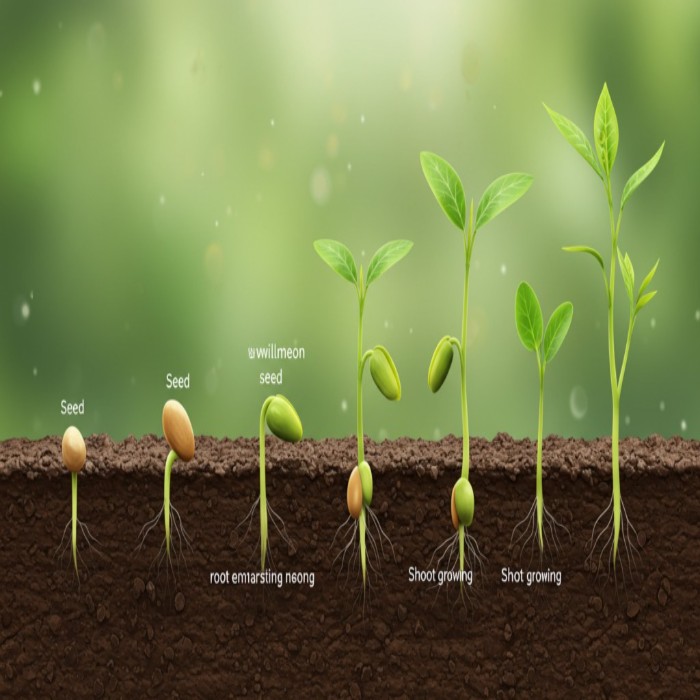how long does it take for seeds to germinate in rainy season
how long does it take for seeds to germinate in rainy season

Introduction
Discover how long does it take for seeds to germinate, as germination times can vary from a few days to months based on seed type and conditions. Many gardeners often wonder how long does it take for seeds to germinate in rainy season. This question appears simple, but the answer depends on several factors. The rainy season influences soil, temperature, and air balance. These factors play a key role in deciding seed germination time. Moisture from frequent rain supports sprouting. Still, excess water sometimes delays the process. Each type of seed reacts differently to wet conditions. Some seeds sprout quickly, while others take more days. Understanding this difference helps every gardener succeed.
Understanding Seed Germination
Seed germination means the first stage of plant growth. The seed absorbs water, swells, and breaks its coat. The root comes out first and moves downwards. The shoot then moves upward to reach light. The entire process depends on water, temperature, and oxygen. During rainy season, these elements change often. The soil becomes wetter than usual. The temperature sometimes drops after heavy showers. Still, the natural cycle of seed growth continues. Knowing this process helps you manage your garden better.
Role of Rainy Season in Germination
The rainy season supports germination by keeping the soil moist. Seeds get water without daily watering from the gardener. Warm rains often create perfect growth conditions. Moist soil makes the seed coat soft. As a result, sprouts appear faster. However, heavy rains sometimes create problems. Waterlogging reduces oxygen in the soil. Seeds then struggle to breathe and growth slows down. Fungus also spreads quickly in wet soil. This can damage seeds before they sprout. Therefore, the rainy season plays both a positive and negative role.
How Long Does It Take for Seeds to Germinate in Rainy Season
The exact time always depends on the seed type. Small vegetable seeds like lettuce or spinach sprout within three to five days. Larger seeds like beans and peas take about seven to ten days. Flower seeds such as marigold or sunflower may sprout within one to two weeks. During the rainy season, warm weather and moisture usually speed up the timeline. Still, continuous rain sometimes delays sprouting by several days. On average, seeds sprout between three and fourteen days during rainy season. Gardeners must stay patient and observe daily.
Factors That Influence Germination Speed
Many conditions decide how long does it take for seeds to germinate in rainy season.
-
Soil Quality: Seeds sprout faster in nutrient-rich soil. Poor soil slows down growth.
-
Water Levels: Balanced moisture supports growth. Excess water causes rotting.
-
Temperature: Warm rains improve speed. Cold rains slow down germination.
-
Seed Variety: Different seeds carry different natural timelines.
-
Air Circulation: Healthy air in soil supports roots. Stagnant water blocks oxygen.
-
Light Conditions: Some seeds need light to sprout. Heavy rains sometimes reduce sunlight.
Every factor plays a role. A gardener must check and manage these conditions regularly.
Tips to Improve Seed Germination in Rainy Season
Several methods help you improve seed sprouting during rainy season.
-
Always prepare the soil before sowing. Remove weeds and loosen the soil.
-
Place seeds at the right depth. Too shallow or too deep planting delays sprouting.
-
Create raised beds or containers. This prevents waterlogging during heavy rains.
-
Add natural compost or manure. This improves soil structure and drainage.
-
Cover seed beds lightly with straw or mulch. This protects soil from excess rain.
-
Ensure proper spacing between seeds. Overcrowding reduces air and sunlight.
-
Select seed types that perform well in wet climates.
By using these tips, you reduce risks and speed up sprouting.
Common Mistakes to Avoid During Rainy Season
Many gardeners make common mistakes during rainy season. These mistakes reduce seed success.
-
Planting seeds in poorly drained soil blocks oxygen.
-
Sowing seeds too close together creates competition for space and light.
-
Using chemical fertilizer during heavy rains damages seeds and soil life.
-
Planting seeds at the wrong depth prevents proper sprouting.
-
Ignoring fungal growth during wet days results in seed loss.
-
Watering seeds even during rain creates over-saturation.
Avoiding these mistakes increases your success rate in the rainy season.
Practical Examples of Seed Germination in Rainy Season
Different plants show different results during rainy season. For example, spinach seeds sprout in four days. Lettuce seeds also sprout quickly within three to five days. Beans sprout in about one week if soil remains warm. Marigold flowers sprout in seven to ten days even with heavy rain. On the other hand, seeds like carrots take longer. They may need up to two weeks. These examples show the wide range of seed germination times in rainy season.
Conclusion
So how long does it take for seeds to germinate in rainy season? Most seeds sprout within three to fourteen days depending on the variety. Rainy season provides natural moisture that supports fast germination. Still, excess rain sometimes creates challenges like fungus, waterlogging, and oxygen shortage. Smart soil care, proper sowing depth, and balanced spacing reduce these risks. Gardeners who follow these steps enjoy faster germination and stronger seedlings. The rainy season therefore remains both a challenge and an opportunity. With the right methods, it becomes the perfect season for seed growth.




